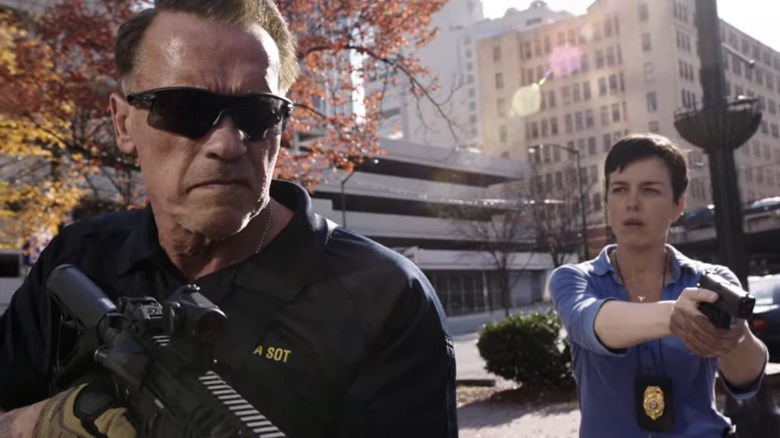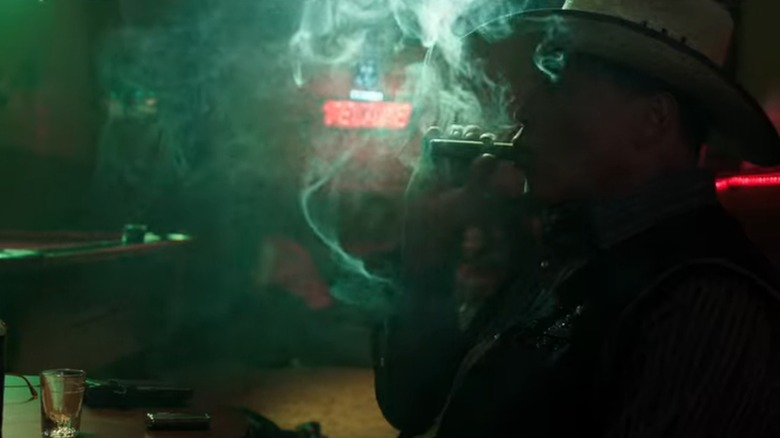The Ending Of Sabotage Explained
DEA Special Operations Team leader Agent John Wharton aka Breacher (Arnold Schwarzenegger) sees his squad as like a family. Unfortunately, sometimes it's the people closest to you that are capable of doing the most harm.
At the beginning of "Sabotage" (which has been killing it on Netflix), Breacher and his motley crew steal $10 million from a massive cartel bust, a risky move that they believe will be worth it once they split the loot. When they go back to retrieve the money, though, they find that someone else has beat them to the punch. As though the paranoia created by the question of who took their stolen goods wasn't bad enough, soon members of the team begin turning up dead in a series of grisly homicides.
The most likely culprit for these murders is the cartel that Breacher's team took the money from. That's the lead that Investigators Caroline Brentwood (Olivia Williams) and Darius Jackson (Harold Perrineau) are following once they are assigned to the case. When the trail finally leads them to the bodies of several cartel hitmen whose DNA was found at the crime scenes, they make a chilling discovery.
The cartel members were killed before Breacher's team was, which means someone else committed the murders and is trying to make it look like a cartel hit job. And considering the members of Breacher's team are the only ones who know about the stolen money, all signs point to there being a traitor in their midst.
Who committed the murders? Who stole the money? And who has been playing who? Here's how this twisted and bloody plot unravels itself at the end of "Sabotage."
Lizzy's murderous plan is revealed
At the beginning of the final act of the film, two major secrets are revealed. First, we learn that Lizzy (Mireille Enos) and Sugar (Terrence Howard) have been having an affair behind the back of their fellow squad member and Lizzy's husband, Monster (Sam Worthington). Even more shocking is the revelation that they're the ones committing the murders. By the time the duo kills the final two squad members, Breacher and Brentwood have put together all the pieces. They set up an ambush in order to catch the murderous couple but, of course, Lizzy and Sugar smell it a mile away.
The ambush turns into a violent shootout and car chase that leaves Sugar dead and Lizzy gravely wounded. When Breacher confronts her, she confesses to murdering their teammates. However, she didn't commit the murders to cover for the fact that she stole the $10 million. In fact, she committed them because somebody else stole the money and she wanted revenge.
"They f—ing robbed me. After everything I put up with," she says. Throughout the movie, members of the squad occasionally questioned Lizzy's ability to keep up with them. Although it's never stated explicitly, this could be because she's the only woman on the team. It also doesn't feel like a coincidence that she's the only one of them without a nickname. As she lays dying, she declares to Breacher, "It was my money and they took it ... I said, 'F— them!'"
Lizzy's confession solves one of the big mysteries of the film. However, it also creates another. It seemed like a given that whoever was committing the murders was also the person who stole the money, but that's clearly not the case. So, who actually took the $10 million?
The secret Breacher has been keeping all along
Shortly after Lizzy's confession, Breacher makes one of his own. He's the one who stole the cartel money and is the reason this whole violent saga kicked off. This is a shock until you consider how everything went down. Breacher was the one who suggested they take the money in the first place and as the leader of the squad, he put pressure on the team to keep it a secret after it went missing and squad members began turning up dead. He also has a very specific motivation for taking the loot.
While the present action of the film is tightly focused on the mystery of the missing money and the murders, there are many references throughout to a dark chapter from Breacher's past. Prior to the events of the film, his wife and son were kidnapped by a cartel that he helped run a successful operation on. The cartel horrifically murdered them, filmed it, and sent the tape to Breacher. Although certain parts of this story were revealed early in the movie, as it goes on, the level to which Breacher is obsessed with getting revenge on the cartel slowly becomes more and more clear. At one point, we even find out that he went on a renegade mission to hunt down the cartel members in Mexico, but he ultimately didn't get the men he wanted.
At the time, Breacher failed to get his revenge with the resources at his disposal. But $10 million could certainly go a long way in helping him complete that mission.
The ending of Sabotage reveals the film's true meaning
After Breacher kills Lizzy he flees, leaving Brentwood stunned. Although he did ultimately help her get to the bottom of the murders, Breacher also used their increasingly close relationship to stay one step ahead of the investigation and make sure his own interests were protected. When the truth about the stolen money came to light earlier in the film, he even lied to Brentwood and told her that he organized the initial theft from the cartel to give something back to his squad. The truth of the matter is, though, he had a singular goal in mind, and that was to get revenge.
In the movie's final scenes, Breacher travels to Mexico and uses the stolen money to bribe an official into telling him where the cartel leader who is responsible for his family's death is hiding. He finds the man and his associates at a bar and kills them all in an intense shootout. In the end, Breacher sits at a table, bleeding from a potentially fatal gunshot wound, and has a glass of whiskey and a cigar.
The movie doesn't reveal whether Breacher ultimately succumbs to his wounds, but that's not the point. Right before Lizzy dies, she tells him, "Your family is never coming home ... and nothing you do will ever change that."
Breacher is well aware of that fact. Bringing them back was never his goal and whether he lives to come out the other end of his bloody vendetta is similarly irrelevant. Although it is set up like a whodunit, "Sabotage" is ultimately the story of one man's relentless quest for revenge and the horrors that accompany such a mission.



